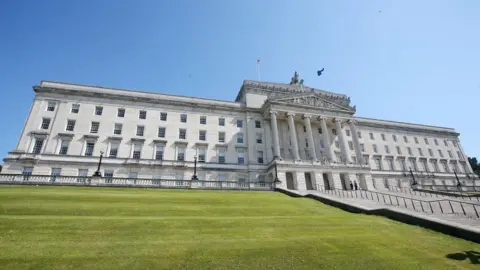NI Civil Service at 'critical crossroads' over staffing pressures
 BBC
BBCNorthern Ireland's Civil Service is at a "critical crossroads" and struggling to cope because of the extra pressure on staffing levels, a report has found.
Auditor General Kieran Donnelly said almost 1,500 vacancies have yet to be filled and sickness levels remain the highest in the UK.
He also raised concerns about how civil servants are being recruited and called for the system to be transformed.
A total of 268,000 days of absences were recorded at a cost of £32.9m.
Mr Donnelly said to function effectively departments need to have "the right people in the right place at the right time" and there has not been the "strategic focus" to ensure this is the case.
'High sickness level'
The report notes the latest figures which show, on average, almost 13 working days are lost due to sickness per staff member in Northern Ireland, compared with between seven and eight days in other parts of the UK.
"This high sickness absence level across a head count of 22,000 can only have reduced the strength of Northern Ireland Civil Service's (NICS) capacity and capability, so addressing the area is clearly a matter of priority," the report said.
 PA Media
PA MediaAnxiety, stress and depression among staff accounted for almost 40% of the days lost.
The report reveals that 4,000 civil service jobs were lost between 2015 and 2019, mainly through a voluntary exit scheme.
But the auditor warned the civil service is now facing unprecedented challenges because of welfare reform, preparations for Brexit and dealing with the Covid-19 pandemic.

There is one glaring vacancy in the civil service, which is proving difficult to fill, and it is the one which will be key to fixing the problems laid bare by the auditor.
Northern Ireland's Civil Service is still without a leader almost three months after the previous holder of the post, David Sterling, retired.
Three candidates interviewed for the job were not deemed suitable by the first and deputy first ministers.
But leaving such a void at a time when civil servants are battling a pandemic and preparing for Brexit is far from suitable and raises big questions about this recruitment process.
We may end up with an interim head of the civil service - yet another short-term solution to a long-term problem.

The report recognised that NICS staff "have continued to deliver vital services to the people of Northern Ireland during unprecedented challenging circumstances, including preparing for the exit from the European Union and responding to the Covid-19 pandemic".
However, it added that the NICS "is now at a critical crossroads, struggling to deal with providing 'business as usual services'".
'No certainty, no leadership'
The auditor's report revealed that in one year only 19 unsatisfactory performance ratings were recorded across a workforce of more than 22,000 people.
Alison Millar, the general secretary of the public service union Nipsa, rejected any suggestion that civil servants were under no pressure to perform.
She said a "failure of leadership within the civil service" had been a significant issue.

"Civil servants delivered through three years when there was no executive in place," she said.
"We now have a situation where there are 43 days left to the European exit, again we're left with no certainty in what that is and civil servants have been working incredibly hard in this Brexit world with no leadership."
There are high staff vacancy rates in the civil service, with 1,420 full time posts remaining unfilled.
The report also revealed that agency staff costs last year rose from almost £18m to £45.7m.
Mary Madden, a former civil servant who ended her career in the Department of Justice, said that although there is an "awful lot of hardworking people in the civil service" it needs to become "more professional and upskill its workforce".
"You need to bring in more specialists - most civil servants are generalists and they are dealing with very complex things," she told BBC Radio Ulster's Talkback programme.
'500 vacancies filled'
Ms Madden said that an aging workforce - due to a recent lack of recruitment - meant the service needed a refresh in terms of its staffing.
"It is a natural thing that older people are generally more susceptible to illnesses which take them out of work.
"That is a common theme across all departments - an ageing workforce as well as extra pressure because the numbers were reduced".
The auditor general also found the current recruitment process was "cumbersome, slow, and did not provide sufficient assurance that the right people are placed in the right posts".
It noted that appointments were made to grades rather than to specific job roles and "skills and experience most relevant to positions are not always tested".
Stormont's Department of Finance, which has responsibility for the NICS, said it had recently carried out an external recruitment drive, helping to fill about 500 vacancies with more appointments planned.
It added that the service recognised the need for "fundamental change" and would build on "progress" made through the reform of the organisation.
"The Audit Office report acknowledges that the Civil Service has delivered vital services against a backdrop of unprecedented and challenging circumstances and has made progress in many of the areas highlighted in this report," added the department.
